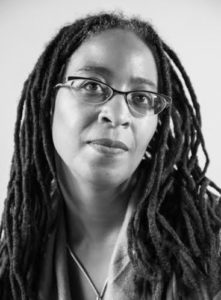Camille Dungy, a professor in CSU’s Department of English, has won another major honor: a Guggenheim Fellowship.
On April 9, the Board of Trustees of the John Simon Guggenheim Memorial Foundation named Dungy among the 168 scholars, artists and writers to receive the fellowship this year. Appointed on the basis of prior achievement and exceptional promise, the successful candidates were chosen from a group of almost 3,000 applicants in the Foundation’s 95th competition.

“Camille Dungy has already distinguished herself as a major poet and essayist,” said Louann Reid, head of the Department of English. “Receiving the prestigious Guggenheim award raises her to prominence among outstanding writers who have been U.S. Poets Laureate, recipients of the National Book Award and Nobel Prize winners. This well-deserved award not only recognizes Camille but also increases the prestige of the CSU Creative Writing Program.”
“This honor means more than I can easily put into words,” Dungy said. “So many of my heroes are also Guggenheim Fellows, and to be honored in this same way feels like a culmination of a great deal of hard work.”
Past winners
Dungy is believed to be the first woman at CSU to win a Guggenheim Fellowship. James Bamburg, a professor of biochemistry, won in 1978; C. Richard Tracy, a professor of zoology, won in 1980; and Jorge M. Vivanco, a professor and director of the Center for Rhizosphere Biology, won in 2007. Dungy’s colleague in the English department, Professor Dan Beachy-Quick, became the first CSU humanities faculty member to win a Guggenheim in 2015.
“Camille has long been at work in necessary and searching ways, writing poetry and prose that bring her readers — including students and colleagues — closer to issues most dear and most complex: climate, race, history, parenting, poems,” Beachy-Quick said. “What marks the work is a generosity and care of vision, a rigor and kind honesty in voice that opens us to issues that otherwise might close us down. That’s a gift worthy of such an honor as a Guggenheim.”
About her project
Dungy says she plans to use the undisclosed Guggenheim funding over the next two years to work on a project called “Soil.” She describes it as a deep exploration into the intersection of an accelerating environmental crisis and socio-cultural issues around love, family, survival and care. The term “soil,” Dungy says, refers to the substrate out of which plants emerge — and the fact that you have to get dirty sometimes to help things grow.
“I understand this fellowship to be a starting block for my journey towards a new set of possibilities and artistic discoveries,” she said. “I’ll pause very briefly to celebrate what this means to me and to the communities who have supported my work through the years. Then I’ll start digging in the soil again — and see what starts growing.”
She says the Guggenheim is the highest honor she has received. Last August, the New York Times Magazine published Dungy’s poem “Still Life,” adding to an already impressive list of accomplishments. Her 2017 debut prose collection of personal essays, Guidebook to Relative Strangers, was a finalist for the National Book Critics Circle Award. Trophic Cascade won the 2018 Colorado Book Award for poetry, and both of those books were finalists for the 2018 Hurston/Wright Legacy Award.
Other honors
In 2017, Dungy won a prestigious creative writing fellowship from the National Endowment for the Arts. Her other poetry collections are Smith Blue, finalist for the William Carlos Williams Award; Suck on the Marrow, winner of the American Book Award; and What to Eat, What to Drink, What to Leave for Poison, finalist for the PEN Center USA Literary Award for Poetry. Her poems and essays have appeared in Best American Poetry, Best American Travel Writing, 100 Best African American Poems, over 30 other anthologies, plus dozens of print and online venues, including Poetry, American Poetry Review, VQR, Guernica and Poets.org.
“I think of the Guggenheim Fellowship going to Black writers starting in the ’20s and ’30s,” Dungy said. “It represented a point where those writers who won it were able to really sink into the work they were doing, and the world took more notice of the work they were doing. It’s a really wonderful thing.”
She has a piece coming out in Poets and Writers Magazine called “Say Yes to Yourself,” an essay providing practical guidance on how to be a writer and still maintain other parts of one’s life, like being a parent.
“It’s about things like allowing yourself to do the laundry, but maybe not putting it away right away,” Dungy says.
‘Best of the best’
“It’s exceptionally satisfying to name 168 new Guggenheim Fellows,” said Edward Hirsch, president of the Foundation. “These artists and writers, scholars and scientists, represent the best of the best. Each year since 1925, the Guggenheim Foundation has bet everything on the individual, and we’re thrilled to continue to do so with this wonderfully talented and diverse group. It’s an honor to be able to support these individuals to do the work they were meant to do.”
Since its establishment in 1925, the Foundation has granted more than $360 million in Fellowships to over 18,000 individuals. For more information on the Fellows and their projects, visit the Foundation’s website at www.gf.org.